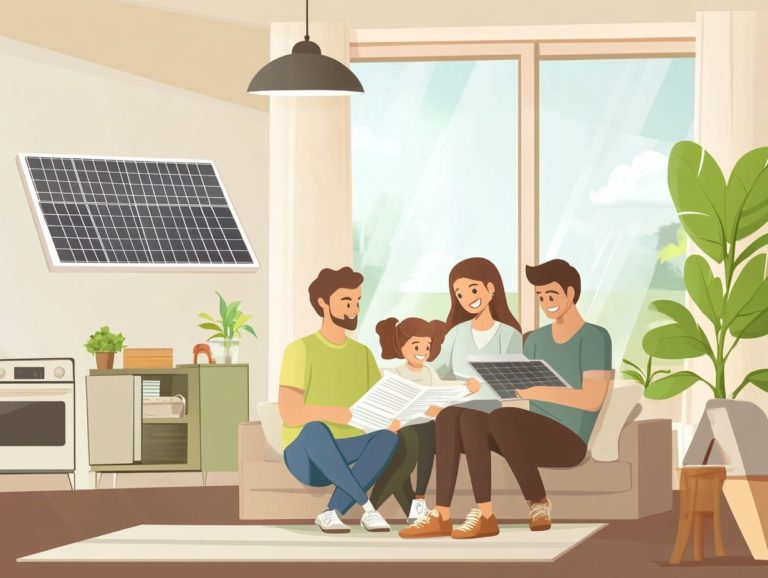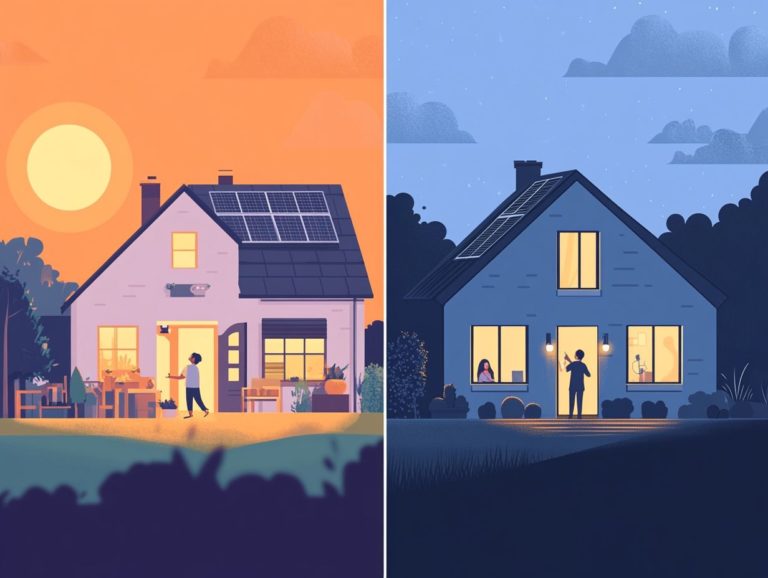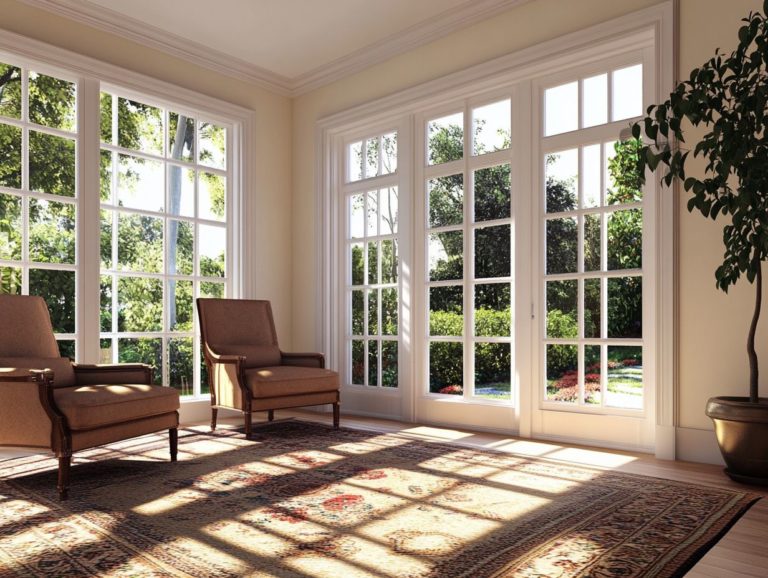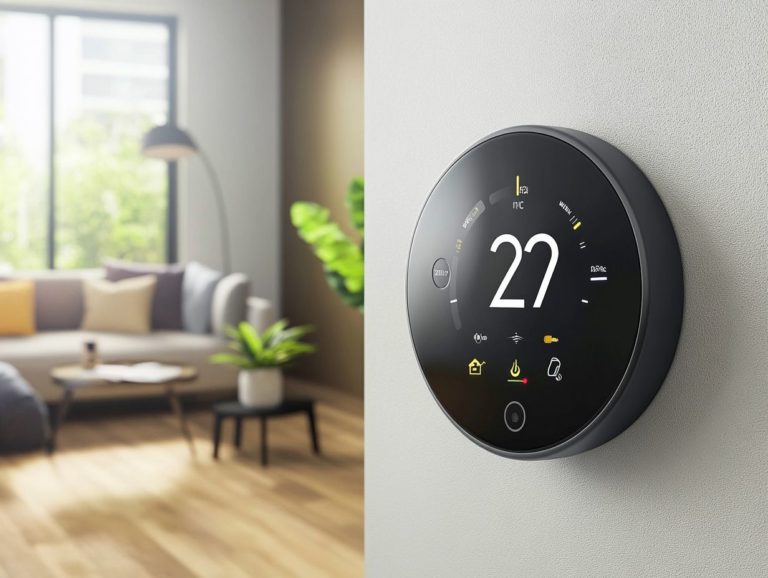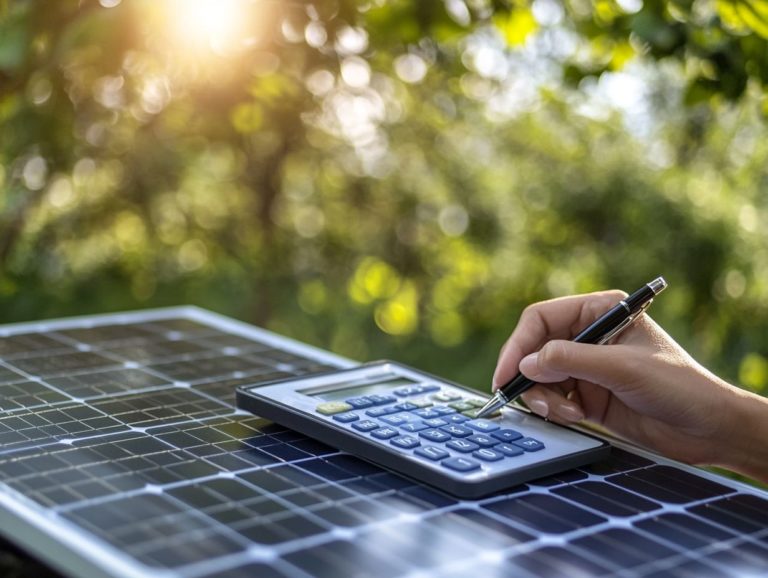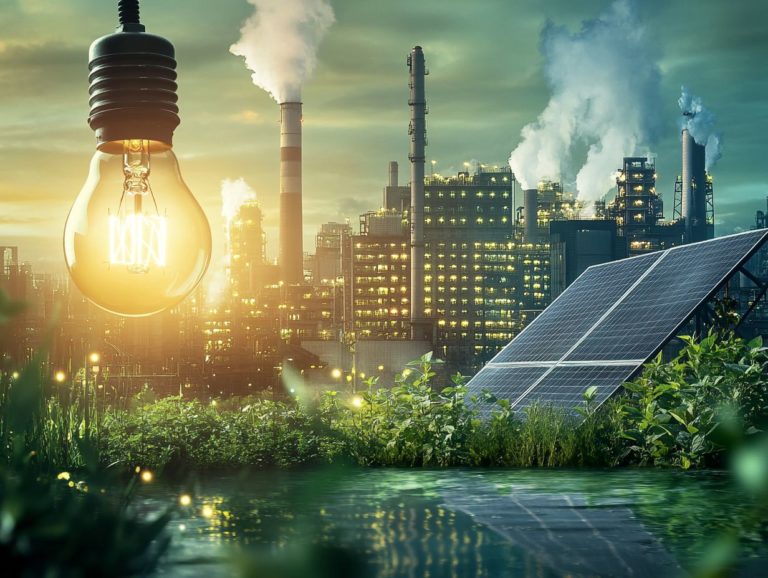How to Choose an Energy Efficient Home?
Energy-efficient homes represent more than just a passing trend; they are an essential stride toward a sustainable future. They offer significant benefits for both the environment and your wallet, especially for eco-conscious homeowners.
Get ready to discover exciting benefits of embracing energy-efficient living and the importance of smart technology. Key considerations await when selecting a home, including factors like location, building materials, and modern appliances that enhance efficiency.
The article also delves into methods for measuring energy efficiency, such as conducting an energy audit. You’ll find straightforward upgrades for existing homes.
Discover how your smarter choices, like opting for energy-efficient appliances and utilizing water-efficient features, can lead to a lifestyle that is not only more comfortable but also eco-friendly, paving the way for a better tomorrow.
Contents
- Key Takeaways:
- The Importance of Energy Efficient Homes
- Factors to Consider when Choosing an Energy Efficient Home
- Assessing Energy Efficiency in Homes
- Transform Your Home: Easy Ways to Boost Energy Efficiency
- Frequently Asked Questions
- What are the benefits of choosing an energy-efficient home?
- How can I determine if a home is energy efficient?
- What factors should I consider when choosing an energy-efficient home?
- Is it more expensive to purchase an energy-efficient home?
- Can I make an existing home more energy-efficient?
- Are there any resources available to help me choose an energy-efficient home?
Key Takeaways:
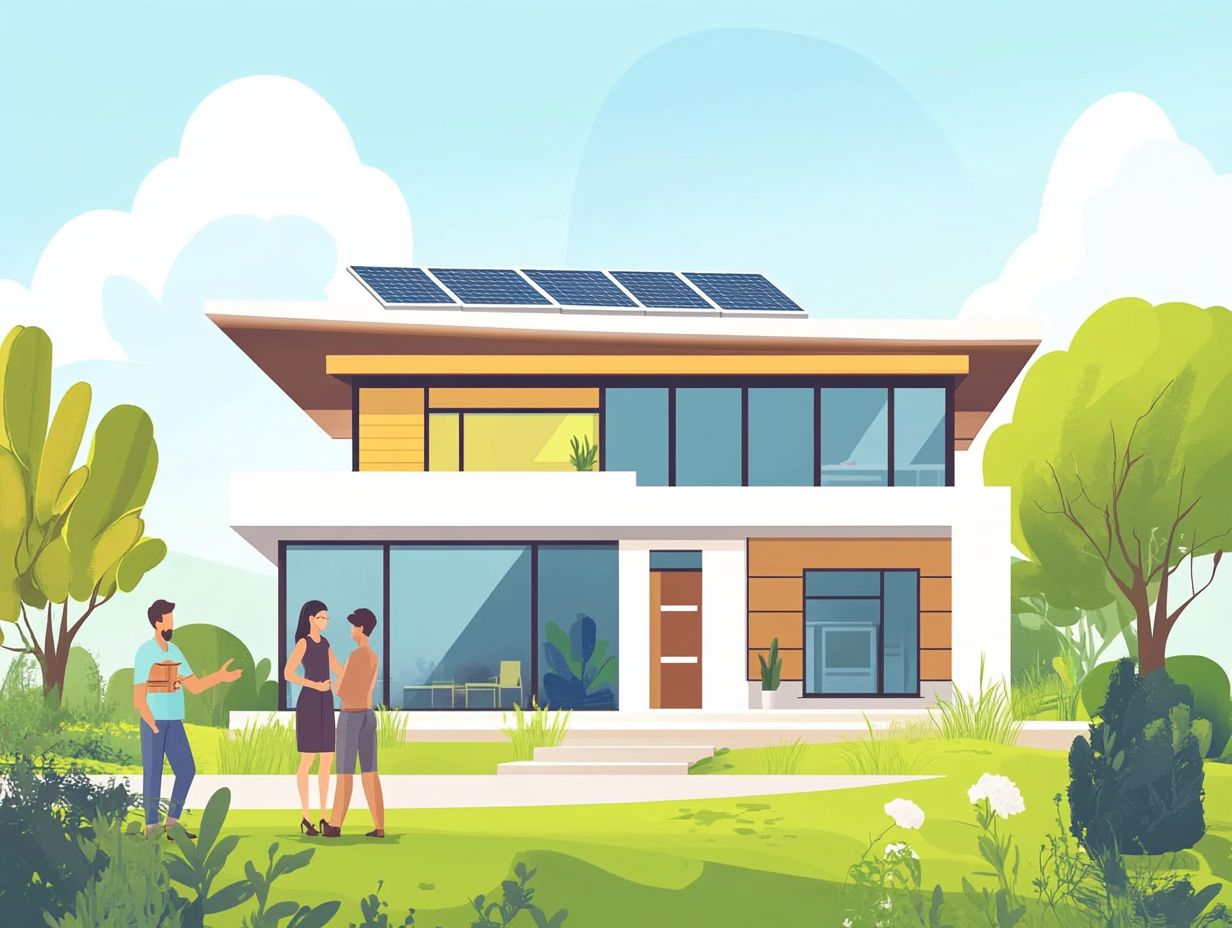
- Consider location and climate when choosing an energy-efficient home. This can greatly impact the home’s energy needs and efficiency.
- Look for energy-efficient building materials, appliances, and systems. These can significantly reduce energy consumption and costs.
- Assess energy efficiency through rating systems and certifications, like Energy Star. This helps you understand the home’s energy performance.
The Importance of Energy Efficient Homes
Energy-efficient homes are rising in prominence, benefiting both the environment and your wallet. They provide substantial energy savings and help lower utility bills through the use of smart devices, energy-efficient appliances, and innovative design.
By integrating energy-efficient appliances, heating, ventilation, and air conditioning systems, and sustainable materials, these homes effectively minimize their impact on the environment while enhancing your comfort.
They also pave the way for long-term cost savings with energy-efficient windows, solar panels, and passive solar design. This creates a seamless blend of eco-friendly living and financial savvy.
Benefits for the Environment and Your Wallet
The advantages of energy-efficient homes go well beyond just looking good. They offer remarkable environmental benefits and significant savings for homeowners, particularly through energy-efficient technology.
By embracing energy-saving practices, such as using water-saving systems, you ll see a noticeable drop in your utility bills, providing you with genuine financial relief. Homes designed with renewable energy options like solar panels and wind turbines not only empower you to be self-sufficient but also allow you to contribute to a healthier planet.
With eco-friendly features such as proper insulation, energy-efficient appliances, and smart home technology, including smart thermostats, you can significantly reduce your carbon footprint and promote sustainability. As a result, you enjoy the dual benefit of lower expenses while making a positive impact on the environment.
This smart approach not only saves you money but also enriches the quality of life for both you and future generations.
Factors to Consider when Choosing an Energy Efficient Home
When you re choosing an energy-efficient home, it s essential to consider important factors that impact both energy savings and your overall quality of life. These include home design and the efficiency of heating and cooling systems. Pay attention to the home s location, climate, design, and the materials used in construction.
Each of these elements plays a significant role in enhancing your living experience while contributing to sustainability.
Location and Climate
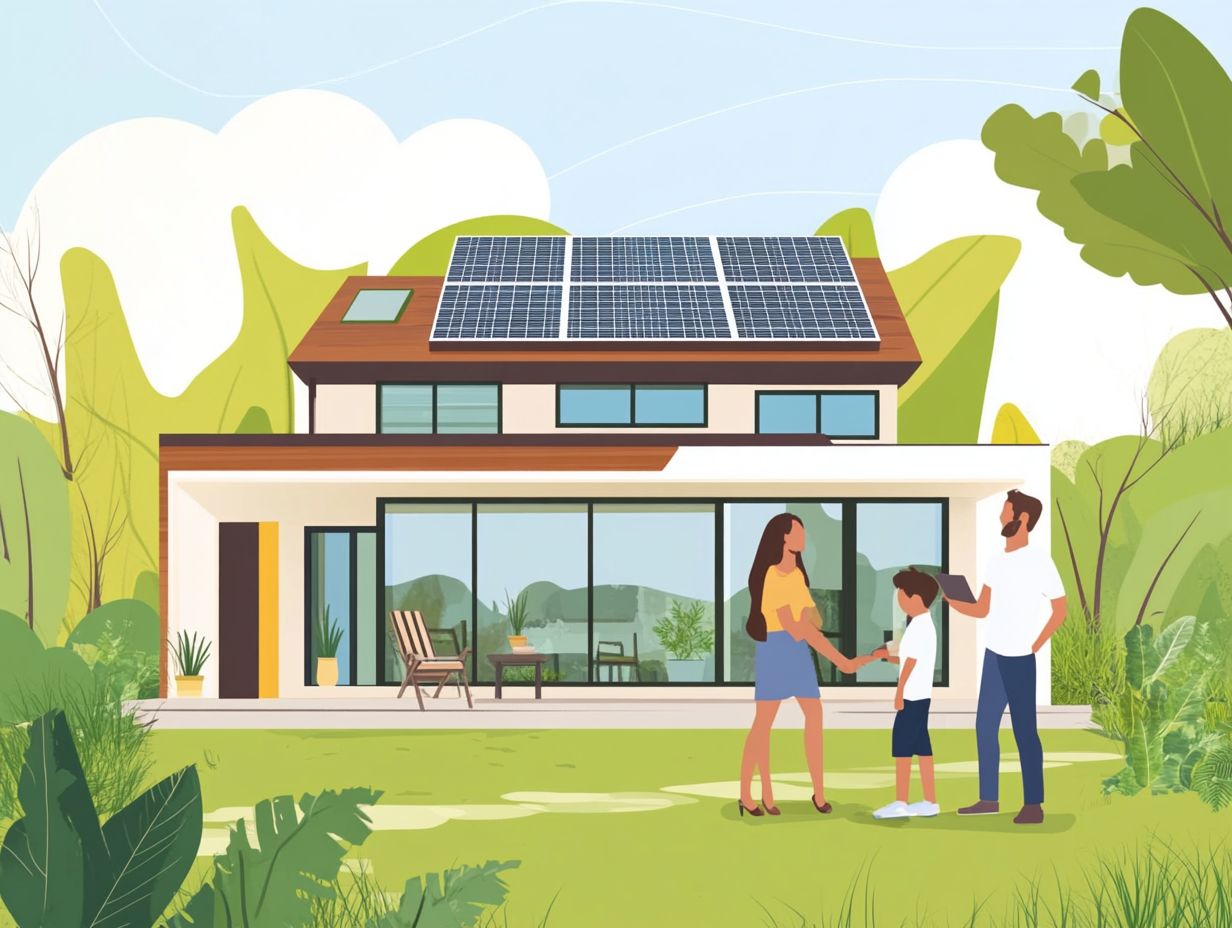
The location and climate of your home are crucial factors in determining its energy efficiency and overall performance. They influence everything from heating and cooling requirements to the effectiveness of insulation.
By understanding your local conditions, you can make informed decisions about design and materials. For example, if you’re in a warmer climate, imagine transforming your home with passive solar design techniques, like strategically placed windows and overhangs, to maximize natural light while keeping unwanted heat at bay. To enhance your renovation plans, consider these 5 tips for energy-efficient home renovation.
On the flip side, if you’re in a cooler region, top-notch insulation becomes essential. It helps retain warmth during those bitterly cold winters, ultimately reducing your heating costs.
Local weather patterns also affect your energy consumption. Homes in areas that experience heavy rainfall can greatly benefit from moisture-resistant materials and water-efficient features. This thoughtful approach not only enhances your comfort but also promotes sustainability and helps you save on long-term energy costs through top energy-efficient home improvements.
Building Materials and Design
The choice of building materials and design plays a pivotal role in your home’s energy efficiency. Opting for sustainable materials and innovative designs can significantly reduce energy consumption.
By incorporating materials such as recycled steel, bamboo, and rammed earth, along with energy-efficient technology, you minimize your carbon footprint while enhancing the overall durability of your structure.
These materials often align with Leadership in Energy and Environmental Design (LEED) standards, which prioritize reduced environmental impact and increased resource efficiency. Understanding the importance of energy efficiency in new builds helps homebuyers make more sustainable choices.
Imagine utilizing eco-friendly aesthetics, such as green roofs and natural insulation, along with energy-efficient lighting. These choices not only improve thermal performance but also create visually appealing results that harmonize beautifully with the surrounding environment.
Ultimately, integrating these elements leads to long-term savings, delivering both economic and ecological benefits in your energy-efficient home design.
Energy Efficient Appliances and Systems
Incorporating energy-efficient appliances and smart technology, including smart thermostats, is a powerful way to enhance energy efficiency while reducing overall energy consumption.
Appliances with the Energy Star certification play a pivotal role in slashing your utility bills by optimizing power usage without sacrificing performance. When you choose energy-efficient models like refrigerators, dishwashers, and washing machines, you not only shrink your energy footprint but also enjoy enhanced functionalities that make daily tasks easier. Additionally, consider how to choose energy-efficient windows to further improve your home’s efficiency.
Beyond just appliances, integrating smart devices such as smart thermostats and advanced HVAC systems provides an intelligent approach to energy management. These systems adapt to your real-time usage patterns, enabling personalized climate control that minimizes waste.
When combined, these innovations create a synergistic effect, leading to significant long-term savings from energy-efficient mortgages that benefit both your wallet and the environment.
Assessing Energy Efficiency in Homes
Evaluating the energy efficiency of your home requires leveraging various energy rating systems, including certifications from the Environmental Protection Agency. These tools offer invaluable insights into your property s energy-saving performance and highlight areas for potential improvements.
What energy-efficient choices will you make for your home?
Energy Rating Systems and Certifications
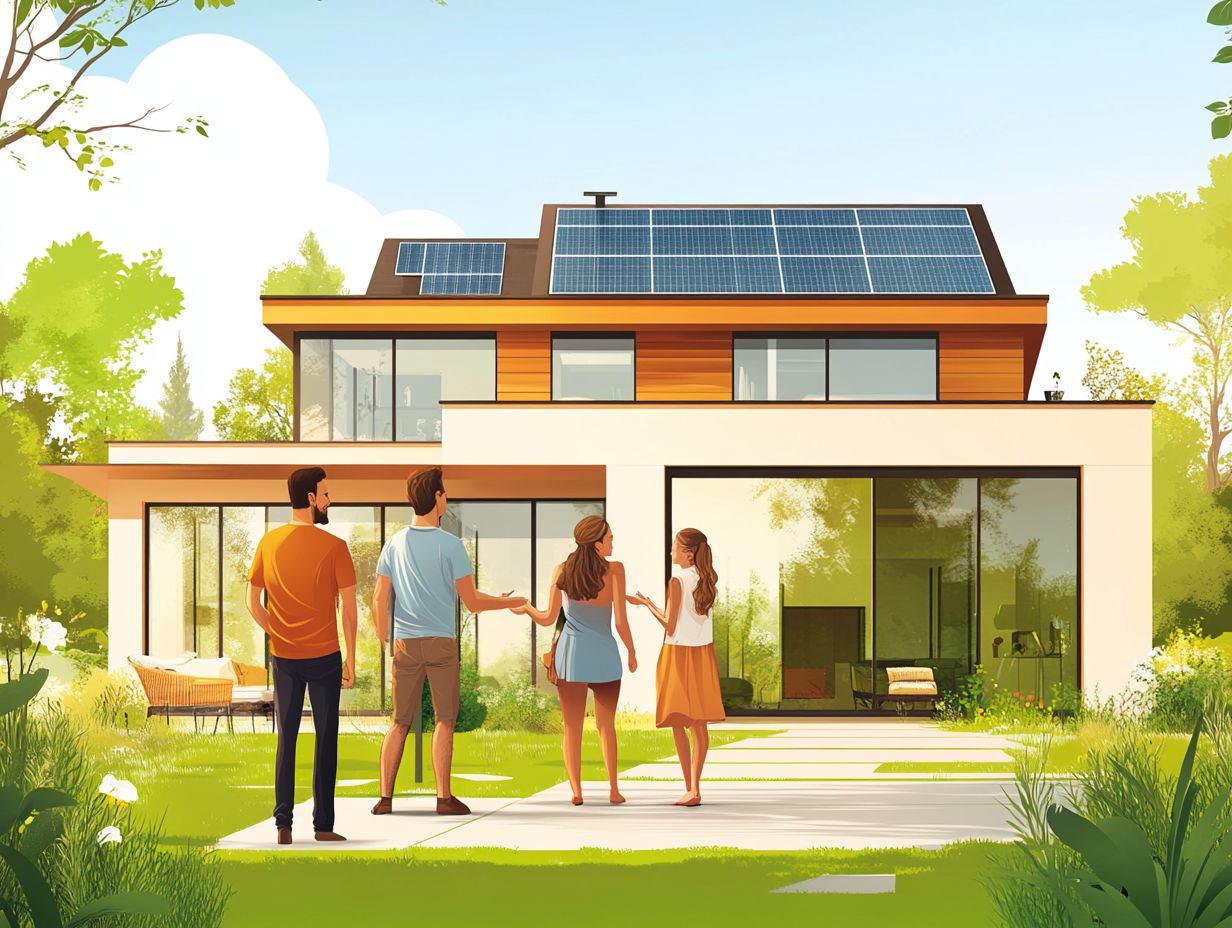
Energy rating systems, like Energy Star and the National Green Building Standard, provide standardized certifications that reflect a home’s energy efficiency and its potential for savings.
These systems evaluate various criteria, including the quality of insulation, the effectiveness of heating and cooling systems, and the efficiency of appliances and windows, helping homebuyers assess energy-efficient homes. As a homebuyer, you can leverage these ratings as a valuable tool when assessing properties and considering energy-efficient mortgages. To maximize efficiency in your own workspace, check out this guide on how to create an energy-efficient home office. A higher rating often translates to lower utility bills and a smaller environmental footprint.
By understanding these systems, you can make informed decisions, prioritizing homes that not only offer comfort but also pave the way for long-term financial savings. With sustainability becoming increasingly important, choosing the right energy-efficient heating system is essential. Energy-efficient homes are emerging as a highly attractive option in the competitive real estate landscape, supported by green realtors.
Transform Your Home: Easy Ways to Boost Energy Efficiency
Enhancing the energy efficiency of your home is not only achievable but can also result in significant cost savings and environmental advantages. Implementing energy-efficient upgrades, such as installing solar panels and utilizing gray-water harvesting, transforms your space into a more sustainable and cost-effective environment.
Simple Changes and Upgrades
Simple changes like installing low-flow fixtures and improving insulation can greatly enhance your home’s energy efficiency. These upgrades often require minimal investment and yield substantial energy savings.
By adopting energy-efficient practices and energy savings tips, you can not only slash your monthly utility bills but also make a positive impact on the environment. Implementing 5 energy efficiency strategies for small homes, for example, can lead to impressive reductions in energy consumption. Swapping out traditional light bulbs for LED alternatives can further enhance these efforts, as these bulbs use significantly less power and have a much longer lifespan, contributing to energy efficiency standards.
Installing low-flow fixtures in your bathrooms and kitchens can dramatically cut down on water usage, resulting in savings on both water and energy bills, further supporting energy-efficient practices.
Embracing smart devices gives you the power to manage your energy use more efficiently. These gadgets allow you to monitor and adjust your consumption remotely, ensuring that you use resources wisely and effectively.
Renewable Energy Options
One great way to enhance your home’s energy efficiency is to explore renewable energy options like solar panels to boost your home’s efficiency and enjoy long-term savings!
You can take advantage of various technologies, including wind turbines and geothermal heating, which can further elevate your sustainability efforts. Not only do these renewable sources help reduce your monthly utility bills, but they also tend to increase your property s value and attract environmentally conscious buyers.
Regarding installation, factors such as roof orientation for solar panels or site suitability for wind turbines are crucial in maximizing efficiency. Financial incentives like tax credits and rebates from local and federal programs can help offset those installation costs, making these energy solutions not only more accessible but also appealing for anyone looking to invest in a greener future.
Frequently Asked Questions
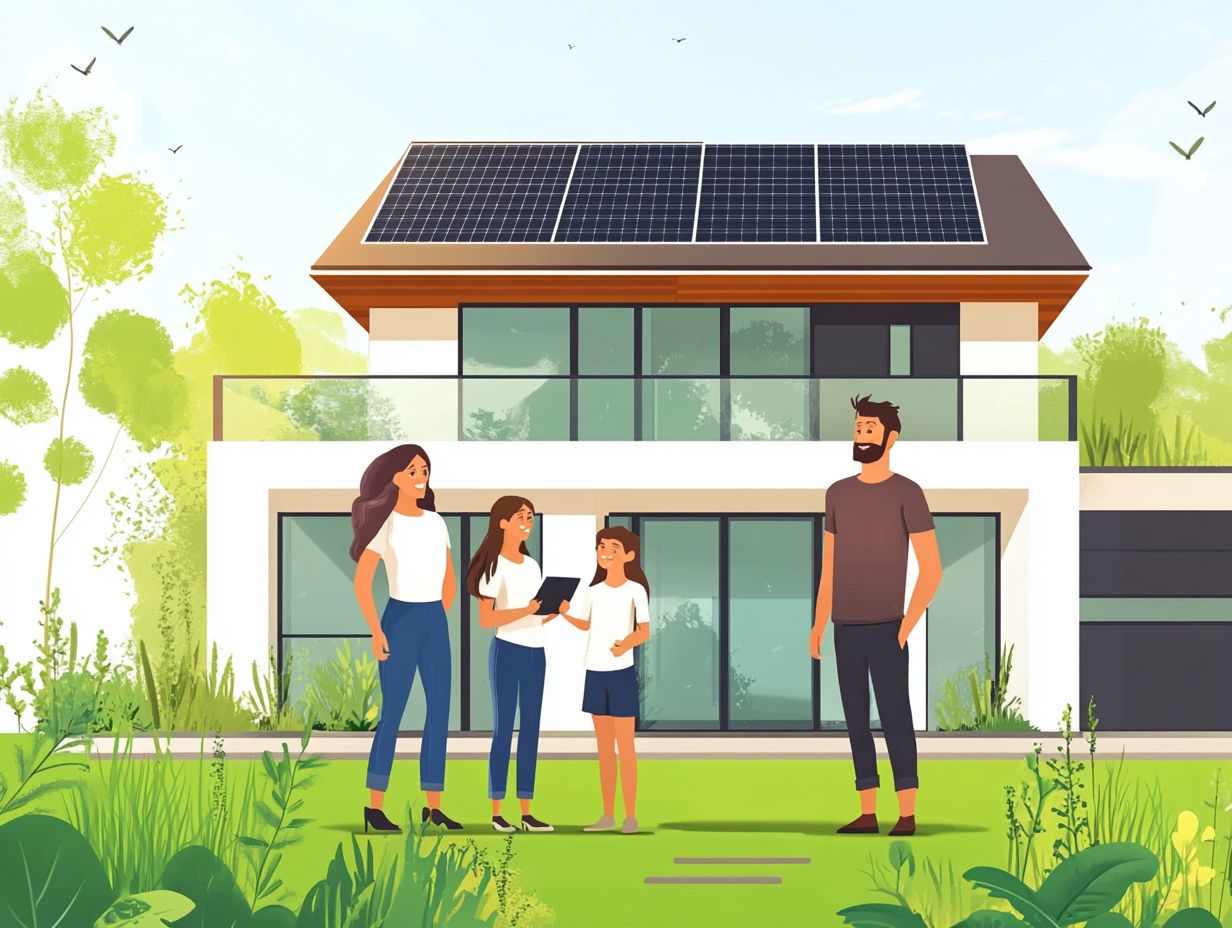
What are the benefits of choosing an energy-efficient home?
Choosing an energy-efficient home can save you money on utility bills, reduce your carbon footprint, and provide a more comfortable living environment.
How can I determine if a home is energy efficient?
Look for features such as Energy Star appliances, efficient heating and cooling systems, proper insulation, and energy-efficient windows and doors. You can also ask for the home’s energy ratings or certifications.
What factors should I consider when choosing an energy-efficient home?
Consider the home’s location, size, age, and design. The local climate and weather patterns also play a crucial role.
Is it more expensive to purchase an energy-efficient home?
The upfront cost may be slightly higher, but the long-term savings on utility bills can be significant. Some states even offer tax incentives for buying energy-efficient homes!
Can I make an existing home more energy-efficient?
Absolutely! You can improve energy efficiency in exciting ways, like upgrading appliances, adding insulation, or installing energy-efficient windows and doors.
Are there any resources available to help me choose an energy-efficient home?
Yes! Many online tools, such as energy efficiency calculators and home energy audits, will help you assess a home’s efficiency before purchasing.

